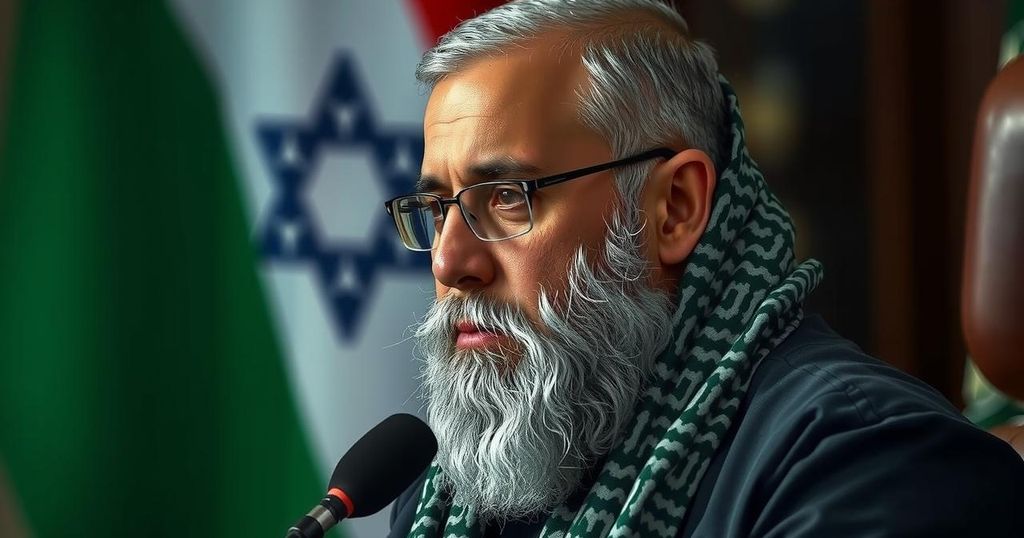Profile and Implications of Hamas Leader Yahya Sinwar’s Death
Israel confirmed the death of Yahya Sinwar, the head of Hamas’ political bureau and a central figure behind the October 7 attack on Israel. This event is seen as a possible turning point in the year-long conflict between Israel and Hamas, which has resulted in extensive casualties. Sinwar, who has a history of involvement with Hamas and was considered a hardliner, previously expressed caution regarding conflicts with Israel. The death of such a prominent leader raises questions about the future direction of Hamas and the ongoing violence in the region.
Israel announced on Thursday that it had successfully executed Yahya Sinwar, the recently appointed head of Hamas’ political bureau, whom both the United States and Israel hold responsible for orchestrating the attack on Israel on October 7, 2023. This event marks a significant shift in the ongoing conflict between Israel and Hamas, which has persisted for over a year. Following the operations in Gaza, the Israeli Defense Forces (IDF) and the Israel Security Agency confirmed that Sinwar had indeed been “eliminated.” Reports indicate that senior officials from the Biden administration have long viewed Sinwar’s death as a pivotal turning point, and they believe that his removal could potentially lead to a conclusion of hostilities between Israel and Hamas. Sinwar ascended to his role as head of Hamas’ political bureau shortly after Ismail Haniyeh, another prominent Hamas leader, was assassinated in Tehran in July. He was characterized by Israeli officials as the architect of the October 7 attack, a significant and devastating assault on Israel that resulted in approximately 1,100 Israeli fatalities. Having initially joined Hamas in the late 1980s and having been sentenced to multiple life terms for the abduction and murder of Israeli soldiers, Sinwar became a notable figure within the organization. He was imprisoned until his release in 2011, part of a prisoner exchange for Israeli soldier Gilad Shalit. Since that time, Sinwar has engaged in numerous confrontations with Israel, including the 11-day conflict in May 2021 when Hamas launched an onslaught of rockets into Israeli territory, prompting Israeli retaliatory airstrikes in Gaza. The U.S. State Department designated Sinwar a global terrorist in 2015, and he has faced sanctions from both the United Kingdom and France. Four years ago, he was elected as the leader of Hamas in Gaza, predominantly being recognized as a hardliner, and he was re-elected for a further term just before the intensification of rocket attacks on Israel. Notably, Sinwar had previously expressed skepticism regarding escalating conflict with Israel, hinting that a war was against the interests of all parties involved and suggesting that Hamas may be willing to negotiate terms to lift the blockade on Gaza. As this conflict escalates, the humanitarian crisis in Gaza continues to deepen. Israel’s offensive operations in response to Hamas’ actions have led to catastrophic human loss, with over 41,500 fatalities reported by the Hamas-led Gaza Health Ministry since the outbreak of the renewed war. The international community, including the United States, has advocated for an end to hostilities, signaling a potential reevaluation of military support for Israel if humanitarian measures are not implemented. Sinwar’s assassination follows a series of recent targeted killings of prominent leaders from Hamas and Hezbollah, further heightening tensions in the region and complicating the already volatile geopolitical landscape.
Understanding the circumstances surrounding Yahya Sinwar’s leadership role in Hamas provides crucial context to the broader implications of his death. Sinwar’s influence within the organization, characterized by a history of hostility towards Israel, positions him as a key architect of Hamas’ military strategies and its political objectives. The recent escalation of violence began with the October 7 attack, which prompted significant Israeli retaliation, sparking a wider conflict that has led to extensive casualties on both sides. Sinwar’s tenure as a hardened leader who previously expressed cautiousness about conflict highlights a complex interplay of ideology and strategy within Hamas.
Yahya Sinwar’s death represents potential paradigm shifts in the ongoing conflict between Israel and Hamas. Given his prominent leadership role and involvement in orchestrated attacks, the removal of Sinwar may affect Hamas’ operational capabilities and the conflict’s trajectory. It further illustrates the high-stakes nature of the conflict and the dire humanitarian conditions resulting from ongoing hostilities. The international community’s response to these developments will likely continue to shape the dynamics of security and peace efforts in the region.
Original Source: www.forbes.com




Post Comment